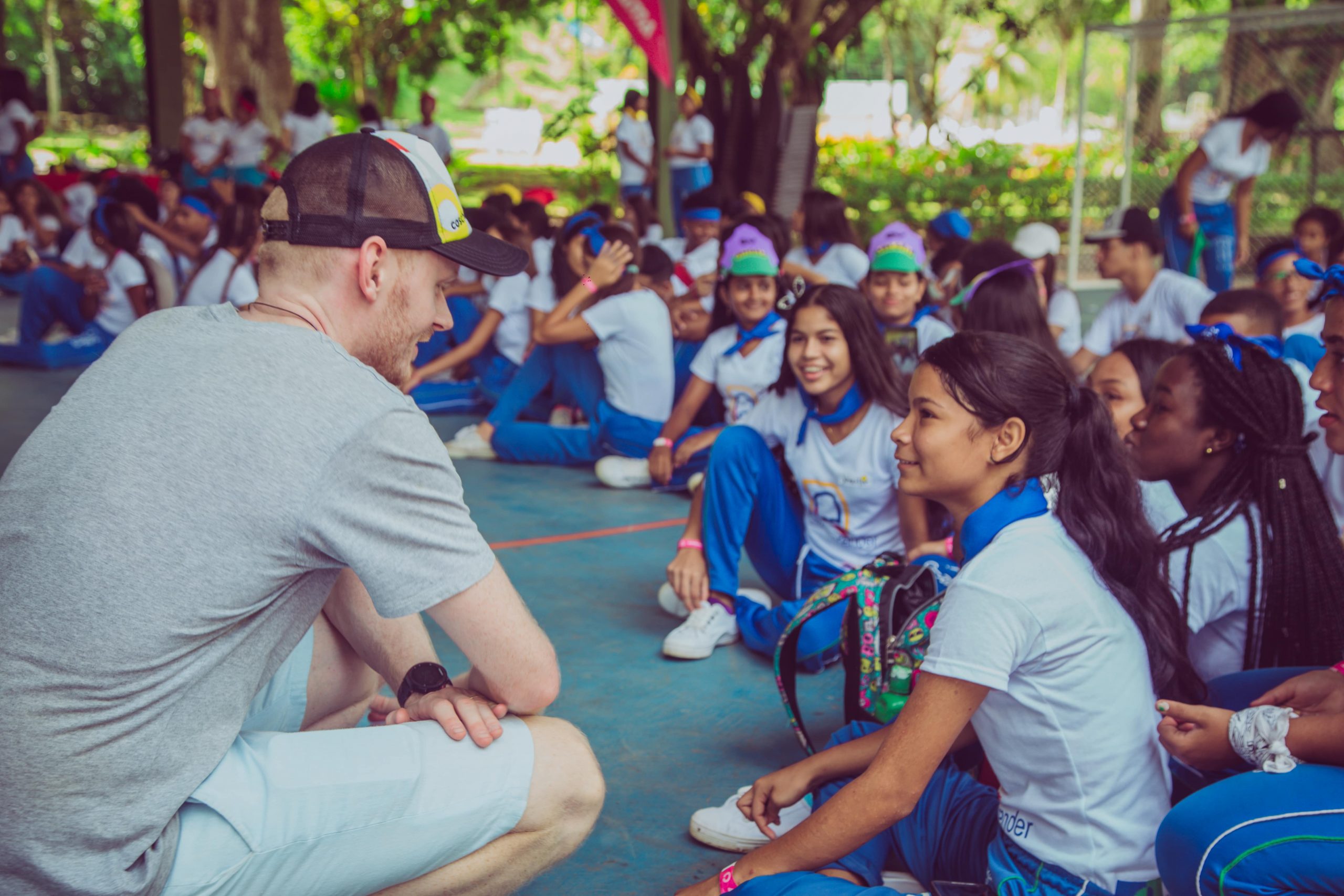Before starting to teach internationally, I taught for five years in an East London state school where the number of students eligible for free school meals was almost twice the national average. At my first international school, students’ personal drivers drove the family BMW through the drive-through to pick up a McDonald’s meal for their charges, who had previously texted in their order on the latest iPhone. To say the difference between the economic backgrounds of students at the two schools was a shock is an understatement. International school fees range from about $8000 a year to more than $30000 which, after working in the UK state school sector can, at times, feel a little uncomfortable, however the majority of international schools offer a range of opportunities for students and staff to help people in the local community who are less fortunate than them.
There is growing research that suggests that, by helping others, we can improve our own wellbeing. Professor Laurie Santos is the creator of The Science of Wellbeing, the most popular course in Yale University’s history (so popular that it’s now available as a free course on Coursera). In her interview with Dr. Rangan Chatterjee, she tells us that “happy people are disproportionately other-oriented” (1:04:10-1:04:13) – in other words, they are more focused on others than themselves. So, by taking part in a project to help your local community, you can simultaneously help yourself. Not only that but, if you involve students in your community project, you’ll be helping them to be happier too!
Helping the local community is all well and good, but we know that teaching is a full time job in itself. Below we’ve shared four suggestions for how you can get involved, ranging from those that require only a small amount of your time to those that require longer term commitment.
Organise a fundraiser
This could be as simple as organising a non-uniform day or it could take the form of a sponsored event such as a 5 km walk or a readathon to raise money for a worthy cause. You could round up a group of colleagues willing to have wet sponges thrown at them and charge students for the privilege, or perhaps organise a charity head shave. Many international schools hold at least one school fete each year at which you could sell refreshments or offer simple games like guessing how many sweets are in a jar, with a small prize for the winner and all proceeds going to charity. Regardless of the age of the students you teach, you’ll almost certainly find a group of willing student volunteers to help with the organisation and execution of the activity.
Run a service learning extracurricular club
Most international schools require teachers to offer at least one extracurricular club for students every week. You could use this as an opportunity to involve students in serving their local community. Unlike one-off fundraisers where students usually give a short amount of their time or donate money, service learning gives them a deeper understanding of underlying issues by engaging them in action research, as well as the opportunity to develop meaningful relationships with members of the community. A useful framework to structure your club is Cathryn Berger Kaye’s five stages of service learning (2013):
Investigate: Students audit their own skills and interests and identify a relevant issue in their community.
Prepare: Students develop their skills and work with the community to plan a solution that meets the identified need.
Act: Students work with their community partners to implement their plan. There are four different types of action: direct, in which students see the impact of their action firsthand; indirect, where students do not see the impact of their action firsthand; advocacy, in which students educate others; and research, in which they collate and present information that can be used by others.
Reflect: Throughout the experience, students reflect on their thoughts and feelings.
Demonstrate: Students document all stages of the process from start to finish and share the process with others.
Some examples of service learning experiences are students writing bilingual books to be used as teaching resources, brightening up local hospital wards by painting murals on the walls, or making colouring books with pictures made up of geometric shapes learned in maths (Berger Kaye, 2013).
You could support students with the investigation stage using Berger Kaye’s MISO method, which encourages students to research the issues in their community by consulting more than just the internet. Students refer to a range of media, such as books, maps and podcasts; interview experts in the field; survey the people who will be affected by the project; and use their own observations to help to identify the needs in the community that could be addressed by their service learning experience (2015).
If you want more information about how to start and run your service learning club, Berger Kaye’s The Complete Guide to Service Learning is a great resource. It includes more information about what service learning is, the process and essential elements of service learning and, most importantly, lots of examples of service learning experiences.
Be a CAS supervisor (at an IB school)
The International Baccalaureate Diploma Programme (IB DP) is a curriculum for students aged 16 to 19, which allows them to study six different academic subjects while developing more holistically through the core element of the programme. A key component of the core is Creativity, Activity, Service (CAS). The IBO defines the service strand of CAS as “collaborative and reciprocal engagement with the community in response to an authentic need” (8). Sound familiar? The service element of CAS is service learning, as described above, and the IBO worked closely with Cathryn Berger Kaye to develop the CAS Guide. While the “community” may be the direct school community or an international community, students are encouraged to find ways to collaborate with their local community, making it the perfect opportunity for you to develop authentic relationships and contribute to a meaningful impact too. You don’t have to teach an IB DP subject to be a CAS supervisor – if you work at a school that runs the IB DP programme, you can get involved by supervising a service experience (a one-off or several one-offs) or project, which lasts for at least one month. To find out more, seek out your school CAS Coordinator. If you’d like to learn more about the IB, read about the differences between the UK, US and IB curricula or how to get IB experience.
Start a business to benefit the community!
That’s exactly what Coschool Colombia co-founder and CEO Henry May did in 2013, after teaching at an international school in Bogota and realising that the children there, although more economically privileged than the students he had worked with in South London during his Teach First training, were facing similar challenges when it came to developing their social emotional skills. May and an ex-Teach For Colombia colleague, Carlos Echeverry, put their heads together, designed a curriculum to build these essential skills and began by selling it to private schools in order to generate an income for the fledgling business. They then established links between private and state schools, giving access to the same fantastic curriculum to children from less economically privileged backgrounds. This collaboration between schools gave rise to the name Coschool – the “co” coming from collaboration. Coschool is a certified B Corporation, meaning that it “meet[s] the highest standards of verified social and environmental performance, public transparency, and legal accountability to balance profit and purpose” (B Corps), and all of the profits are ploughed back into the business. Although Coschool has worked with many of the best international schools in Colombia, the organisation now focuses its work on state schools throughout Latin America, and financial support comes in the form of partnerships with NGOs and big businesses, seeking to fulfill their corporate social responsibilities. They have also received a number of grants, including the prestigious Gates Grand Challenge award, for their Edumoción Movil program, which not only trains teachers and school leaders to manage their classrooms and develop their students’ social emotional abilities, but also to regulate their own stress levels, emotions and relationships with colleagues.
When asked what advice he would give to those who want to start a business to benefit the community, Henry gave these tips:
Listen to what the community wants – with a spark of ingenuity
Community members have the best understanding of the intricacies of the challenges they face but, as outsiders, we may have the advantage of being aware of solutions to similar problems that we’ve seen elsewhere and could also work in this context. Of course, the spark may also come from a member of the community – another reason that listening is so important.
Just start!
So many people have great ideas that never get off the ground because they never took the first step. In the time you spend watching an episode of your favourite Netflix series, you could come up with a great idea, build it and sell it. So just start!
Know how to have difficult conversations
May points out that, as a startup, you’ll be doing something which is both hard and new, and it’s therefore inevitable that you’ll have to have difficult conversations, for example when pitching your business plan to investors, selling your idea to clients or receiving complaints from your users. In the same way that we were taught as trainee teachers to seek out feedback and use it to improve, it’s important as an organisation leader to be able to sensitively give constructive feedback as well as to be able to accept it and use it to get better. Henry and his Coschool co-founder Carlos are still good friends, but they went their separate business ways in 2014. Reflecting on this recently, they came to the conclusion that, had they known how to have these difficult conversations with each other in the early days of the business, things may have turned out differently.
Whether you can give an hour a year or an hour a week; donate money or start a company; get involved in someone else’s project or organise your own, your contribution will have a positive impact on your local community. Not only that, but the act of serving others could also improve your personal happiness. So what are you waiting for? In the words of Henry May, just start!
References
“About B Corps.” About B Corps | Certified B Corporation, bcorporation.net/about-b-corps.
Berger Kaye, Cathryn. “Five Stages of Service Learning.” Education Week, Education Week, 13 June 2013, www.edweek.org/teaching-learning/opinion-five-stages-of-service-learning/2013/06.
Berger Kaye, Cathryn. “The Importance of Action Research.” CBK Associates, 1 May 2015, www.cbkassociates.com/2015/05/01/the-importance-of-action-research/.
Chatterjee, Rangan, podcast host. The Surprising Truth About Happiness with Professor Laurie Santos. Interviewee Laurie Santos, Dr Chatterjee, 27 Jan. 2021, drchatterjee.com/the-surprising-truth-about-happiness-with-professor-laurie-santos/.“Service Learning Students Connecting to the Community.” CBK Associates, May 2013, www.cbkassociates.com/wp-content/uploads/2013/05/Service-Learning-Students-Connecting-to-the-Community.pdf.




